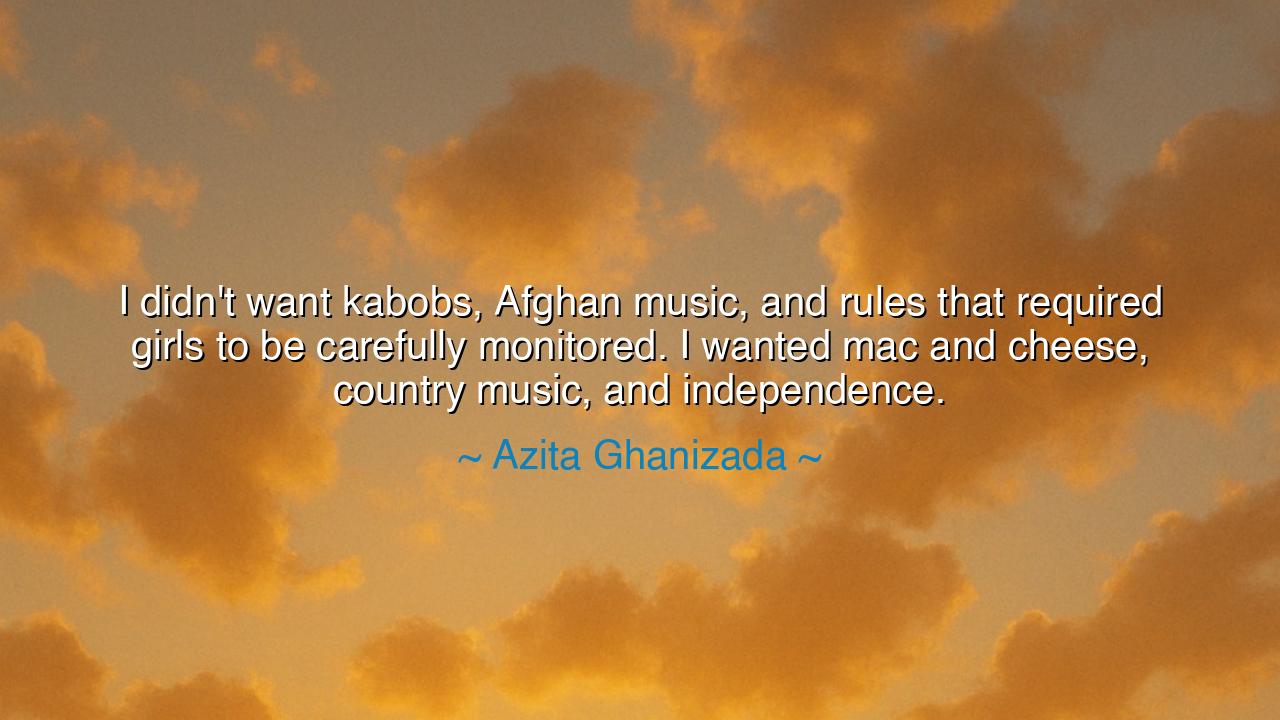
I didn't want kabobs, Afghan music, and rules that required girls
I didn't want kabobs, Afghan music, and rules that required girls to be carefully monitored. I wanted mac and cheese, country music, and independence.






The Song of Two Worlds
Hear the voice of Azita Ghanizada, born between two horizons, who once spoke these words of truth and yearning:
“I didn’t want kabobs, Afghan music, and rules that required girls to be carefully monitored. I wanted mac and cheese, country music, and independence.”
These words, though spoken in the language of the modern age, carry the weight of an ancient struggle—the conflict between heritage and freedom, between the customs that bind us and the destiny that calls us. Within them lies the story of all who are born in one world but grow to belong to another. It is the story of identity torn between the pull of tradition and the cry of the soul for independence.
The Roots and the Wings
To understand Ghanizada’s words, one must first feel the tension of her inheritance. Born into Afghan culture, she was raised among the aromas of kabobs and the echoes of ancestral music—symbols of a people rich in history and pride. Yet with this heritage came rules, especially for girls: boundaries meant to guard, but often to restrain. Against this tapestry of reverence and control, she yearned for something different—a taste of freedom, a life where she could choose her own rhythm, her own song.
So she turned toward the symbols of her new land—mac and cheese, simple and familiar; country music, open and free-spirited; and above all, independence, the power to define her own womanhood. This was not a rejection of her roots, but a claiming of her wings. For every person born between worlds must one day decide which sky to fly beneath.
The Fire of Transformation
Her longing mirrors the journey of countless souls who have walked the path of immigration and transformation. When the body crosses borders, the heart often lingers behind, torn between the comfort of what was and the promise of what could be. Ghanizada’s statement is not rebellion—it is revelation. She speaks for those who love their origins, yet feel suffocated by their constraints; who honor their parents, yet must live by their own light.
This tension is the crucible of growth. The ancient mystics said that the soul, like metal, must be tempered by heat and hammer to gain its strength. So too must the spirit endure the struggle between two cultures, two selves, to become whole. Freedom, then, is not given—it is earned through courage, through the willingness to question the sacred without forsaking its beauty.
The Mirror of History
Let us remember Malala Yousafzai, a child of the same mountains, who defied those who sought to silence her education. Like Ghanizada, she loved her homeland, yet she could not abide its chains. Her bravery was not a rejection of her people but a plea to awaken them—to remind them that true culture is not a cage but a flame, meant to illuminate, not imprison.
In every age, those who seek independence must walk this narrow bridge between reverence and rebellion. From Socrates in ancient Athens to Mary Wollstonecraft in Enlightenment England, the same story unfolds: the individual standing against the weight of inherited expectation, declaring that the human spirit must be free to think, to dream, to become.
The Sacred Struggle Within
Ghanizada’s yearning for “mac and cheese, country music, and independence” is not about food or melody—it is about belonging. It is the cry of one who wishes to live without apology, to choose her own joy, her own identity, her own definition of home. And in this, she embodies the essence of all who seek to reconcile the old world and the new.
For within each of us lives this same duality—the longing for comfort and the hunger for freedom, the love of our roots and the call of our future. The wise do not choose one over the other; they weave both into harmony. They learn that true independence is not rejection, but integration—the ability to honor the past while standing unbound in the present.
The Lesson of Freedom
From this teaching, let all who hear remember: independence is not merely the right to choose—it is the courage to become. It demands that we look into the face of tradition, not with scorn but with understanding, and yet still say, “I will live as I am called to live.”
To the young who struggle between cultures, and to all who fear disappointing the expectations of others, take heart: the world does not need copies of the past—it needs new voices, born of experience and faith, yet fearless in their selfhood. The truest loyalty you can show your ancestors is to evolve their dream, not to remain bound by it.
The Eternal Truth
So live as Ghanizada lived—grateful for your heritage, but unafraid to reshape it. Celebrate your roots, but let your branches reach the open sky. Create your own harmony between tradition and independence, between belonging and becoming.
For life’s greatest gift is not to inherit an identity, but to forge one—to taste the wisdom of your ancestors and still carve your own name upon the wind. And when you do, remember this: freedom is not a betrayal of where you came from—it is the fulfillment of why you were sent.






AAdministratorAdministrator
Welcome, honored guests. Please leave a comment, we will respond soon